Islamic Studies Collection (34 vols.)
Digital Logos Edition
Overview
With over 1.5 billion followers worldwide, Islam is the second-largest and one of the fastest-growing religions in the world. As an aid for comparative religion studies, the Islamic Studies Collection brings together 34-volumes that provide an extensive background on the Islamic faith, its founder and prophet Muhammad, and its relation to the Bible, Jesus Christ, and Christianity. Important for apologetics and missionary work, the volumes in this collection provide:
- A complete history of the life of Muhammad, including William Muir's 4-volume classic The Life of Mahomet
- A detailed history of Islam
- The origins and history of the Qur'an
- Detailed examinations comparing the Bible and the Qur'an
- Studies of the two major sects of Islam, the Shi'ites and Sunnites.
- Comparison studies between Jesus Christ and Muhammad
- A Dictionary of Islam for quick reference to customs, doctrines, holidays, and more
- Handbooks for missionaries
- In-depth examinations into Islamic doctrines
- And much, much more!

- Key histories and studies on the Islamic faith
- Detailed examinations of the life of Muhammad
- Ideal for comparative religion studies
- Both the English and the Arabic translations of the Qur'an included
- Title: Islamic Studies Collection
- Volumes: 34
- Pages: 10,024
- The Life of Mohammed, by George Bush
- The Rebuke of Islam, by W. H. T. Gairdner
- Mohammed and Mohammedanism Critically Considered, by S. W. Koelle
- Development of Muslim Theology, Jurisprudence, and Constitutional Theory, by Duncan B. Macdonald
- Aspects of Islam by Duncan B. Macdonald,
- The Religious Attitude and Life in Islam, by Duncan B. Macdonald
- Mohammed and the Rise of Islam, by David Samuel Margoliouth
- The Early Development of Mohammedanism, by David Samuel Margoliouth
- Mohammedanism, by David Samuel Margoliouth
- The Coran: Its Composition and Teaching, and the Testimony it Bears to the Holy Scriptures, by William Muir
- The Life of Mahomet, vol. 1, by William Muir
- The Life of Mahomet, vol. 2, by William Muir
- The Life of Mahomet, vol. 3, by William Muir
- The Life of Mahomet, vol. 4, by William Muir
- The Caliphate: Its Rise, Decline, and Fall, by William Muir
- The Apology of Al Kindy, Written at the Court of Al Mamun, in Defense of Christianity Against Islam, by William Muir
- The Mizan Ul Haqq: Balance of Truth, by Carl G. Pfander
- Remarks on the Nature of Muhammadanism, by Carl G. Pfander
- The Faith of Islam by Edward Sell
- Essays on Islam, by Edward Sell
- The Historical Development of the Quran, by Edward Sell
- A Manual of the Leading Muhammadan Objections to Christianity, by William St. Clair Tisdall
- The Religion of the Crescent, by William St. Clair Tisdall
- The Original Sources of the Qur'an, by William St. Clair Tisdall
- A Dictionary of Islam, by Thomas Patrick Hughes
- The New World of Islam, by Lothrop Stoddard
- The Bible and Islam, by Henry Preserved Smith
- The Sword of Islam, by Arthur N. Wollaston
- The Christian Approach to Islam, by James L. Barton
- The Vital Forces of Christianity and Islam
- Christianity and Islam, the Bible and the Koran, by W. R. W. Stephens
- Studies in Mohammedanism, by John J. Pool
- The Qur'an (English)
- The Qur'an (Arabic)
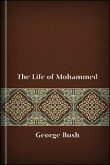
Distilling a mass of sources and collating them with chapters from the Qur'an, George Bush presents a history of the founder of Islam for everyday readers. Bush provides a list of definitions for terms frequently used when discussing Muhammad and Islam and then proceeds chronologically through Muhammad's life.
Mr. Bush is a scholar of extensive acquirements, and well fitted for the task which he has undertaken in this volume.
—N. Y. Observer
George Bush (1796–1859) was educated at Dartmouth College and Princeton University and was a professor of Hebrew and oriental literature at New York University. He is the author of numerous books, including Anastasis, Treatise on the Millennium, and Documents Concerning the Life and Character of Emanuel Swedenborg.
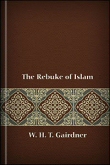
The Rebuke of Islam is the fruit of twenty-years of missionary work by W. H. T. Gairdner in the East. Gairdner gives a short history of the Islamic religion and then takes stock of the successful and unsuccessful missionary work of Christians being done in the East. He then provides a framework for what he believes to be the best methods for evangelization in the East. Contains numerous illustrations, maps, and at the end of each chapter Gairdner provides a list of suggested books for further study.
William Henry Temple Gairdner (1796–1859) was a British Christian missionary with the Church Missionary Society in Cairo, Egypt. A prolific writer and scholar of Arabic, Gairdner edited the magazine Orient and Occident and authored such works as D. M. Thornton: A Study in Missionary Ideals and Methods, The Verse of Stoning in the Bible and the Qur'an, and The Muslim Idea of God.
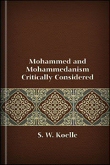
Beginning his missionary career as Professor of Hebrew and Arabic in the Church Missionary College on the west coast of Africa, Koelle spent 40 years living in predominantly Muslim countries and teaching the Bible. This volume is divided into three sections:
- Muhammad Viewed in the Daylight of History
- Muhammad Viewed in the Moonshine of Tradition
- Muhammadanism Viewed in Its Historical Position, Especially as Regards Its Relation to Christianity and Christendom
Sigismund Wilhelm Koelle (1820–1902) was a German missionary and pioneering scholar of African languages. His other works include African Native Literature, Grammar of the Bórnu or Kanuri language, and Polyglotta Africana.
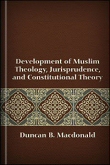
Duncan B. Macdonald provides a general survey in the development of Muslim thought. Macdonald divides the history of Islam into three categories: the state, legal ideas and schools, and theological thought. The last and largest section focuses on Muslim theology, its controversies and conflicts, the rise of Mohammedan scholasticism, and discusses such movements as Wahhabism.
Professor Macdonald deserves great credit for erudite investigation in a field hitherto untouched by any American scholar.
—Princeton Theological Review
The learned professor has admirably executed his important task, and the work will be of real value not only to the student of law, but to all those who desire to compare and contrast the three great religious systems of the East and West.
—Asian Review
To sum up: This work is a credit to American scholarship, and will be welcomed everywhere in the learned world as an important contribution to the literature of its class. All those, especially, who are seriously concerned with Mohammedan studies, will feel themselves deeply it its author's debt.
—The Nation
Brilliant.
—The Quarterly Review
The volume is a much-needed and welcome addition to the scanty materials for an understanding of Islam by English readers.
—Frederick Wells Williams
. . . indispensible for all students of the development of Islam.
—Man: Royal Anthropological Institute of Great Britain and Ireland
Duncan Black Macdonald was educated in Glasgow and Berlin and was Professor of Semitic Languages in Hartford Theological Seminary. The Macdonald Center for the Study of Islam and Christian-Muslim Relations at the Hartford Theological Seminary is named after him. He authored numerous books on Islam and contributed articles to Hastings' Encyclopedia of Religion and Ethics.
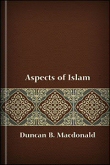
Originally a set of lectures presented as part of the Hartford-Lamson Lectures for 1909, Duncan Macdonald later added more content and revised the lectures for young missionaries. The lectures cover a broad array of subjects, including Muslim theology and metaphysics, the attitude of Islam to the Scriptures and to the person of Christ, Muslim ideas on education, and more.
Professor Macdonald, who is the author of several books on Mohammedan theology and jurisprudence, has in the present volume made excellent use of his personal experiences gathered on a recent journey through the East.
—The Jewish Quarterly Review
No teacher is better qualified, by reason of scholarship, to write on Islam and its prophet than Professor Macdonald. And his scholarship is equaled by his generous breadth of view and his catholicity of feeling. All three qualities are exemplified in this volume.
—Homiletic Review
Duncan Black Macdonald was educated in Glasgow and Berlin and was Professor of Semitic Languages in Hartford Theological Seminary. The Macdonald Center for the Study of Islam and Christian-Muslim Relations at the Hartford Theological Seminary is named after him. He authored numerous books on Islam and contributed articles to Hastings' Encyclopedia of Religion and Ethics.
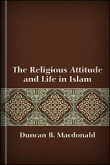
The lectures contained in this volume outline the religious attitude and life of Muslims, as opposed to the systematic theology of Islam. Macdonald examines the extent of the mysticism contained in Islam and the role it plays in everyday Islamic religious-life.
Professor Macdonald gives a deeply interesting view of the religious life in Islam.
—New York Times
We are indebted to Professor Macdonald for a valuable exposition of one phase of Muslim thought.
—The Nation
Duncan Black Macdonald was educated in Glasgow and Berlin and was Professor of Semitic Languages in Hartford Theological Seminary. The Macdonald Center for the Study of Islam and Christian-Muslim Relations at the Hartford Theological Seminary is named after him. He authored numerous books on Islam and contributed articles to Hastings' Encyclopedia of Religion and Ethics.
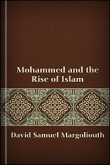
Covering such topics as the birthplace and early life of Muhammad, Islam as a secret society, the history of the Meccan period, the battle of Badr, and more, Mohammed and the Rise of Islam aims to give an objective history of the founder of Islam.
His knowledge of Mohammed and Mohammedanism is unrivalled in this country.
—The Expository Times
This is a book of unusual interest and importance. The biographers of Muhammad form a long succession of distinguished students, but none of them has been better fitted for his work than Professor Margoliouth.
—The London Quarterly Review
Every page bears witness to his erudition. The mass of information crowded into these pages is indeed amazing, and would be confusing but for the consistency of purpose and conception which welds the details into a whole and gives each fact significance.
—The Antiquary
David Samuel Margoliouth was Laudian Professor of Arabic at the University of Oxford from 1889 to 1937 and a member of the council of the Royal Asiatic Society. His numerous works include The Eclipse of the Abbasid Caliphate, The Relations Between Arabs and Israelites Prior to the Rise of Islam, and The Table-talk of a Mesopotamian Judge.
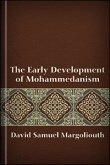
These lectures, delivered in 1913 in the University of London, highlight several items of important contrast between the early days of Christianity and the early days of Islam. The Early Development of Mohammedanism contains the following eight lectures:
- The Koran as the Basis of Islam
- The Same Continued
- The Legal Supplement
- The Status of the Tolerated Cults
- The Development of Mohammedan Ethics
- Asceticism Leading to Pantheism
- The Philosophical Supplement
- The Historical Supplement
David Samuel Margoliouth was Laudian Professor of Arabic at the University of Oxford from 1889 to 1937 and a member of the council of the Royal Asiatic Society. His numerous works include The Eclipse of the Abbasid Caliphate, The Relations Between Arabs and Israelites Prior to the Rise of Islam, and The Table-talk of a Mesopotamian Judge.
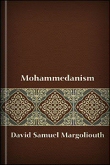
This volume by Oxford University professor D. S. Margoliouth serves as a primer for the Islamic religion and its founder Muhammad. Filled with useful definitions and written in plain, unadorned language, Mohammedanism is a perfect starting place for understanding one of the largest religions in the world.
David Samuel Margoliouth was Laudian Professor of Arabic at the University of Oxford from 1889 to 1937 and a member of the council of the Royal Asiatic Society. His numerous works include The Eclipse of the Abbasid Caliphate, The Relations Between Arabs and Israelites Prior to the Rise of Islam, and The Table-talk of a Mesopotamian Judge.
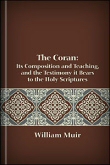
This volume by William Muir provides a comprehensive yet accessible study of the Qur'an. Divided into two parts, the first explores the contents and teachings of the Qur’an; the second part focuses on the Qur'an's connection to and impact on the Bible. Muir has brought together 131 passages, giving the Arabic and the English translation of the same, to show the testimony the Qur'an offers to the authority of the Holy Scriptures.
William Muir (1819–1905) was educated at Edinburgh University and Haileybury College. Muir served as president of the Royal Asiatic Society and published numerous works on Islam, including A Life of Mahomet, Annals of the Early Caliphate, and The Mohammedan Controversy.
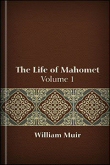
This unabridged, four-volume classic biography of Muhammad is still widely cited for its acute scholarship and historical depth. Volume one contains a 270-page introduction in which Muir provides a history of Pre-Islamite Arabia, setting up the context for the origin of Islam and the birth of its prophet. Then, chapter one covers the birth and childhood of Muhammad.
Mr. Muir has rendered to History and Christianity alike a most import service by the publication of this work.
—Calcutta Review
With freedom from prejudice and independence of judgment, he combines an extensive and intimate knowledge of the most authentic sources of information, and, after several years of labor, has produced these volumes in the hope of contributing to the complete elucidation and final settlement of Muhammad’s real character and claims. It appears to us that the author has abundant reason to be gratified with the success he has achieved.
—British Quarterly Review
His biography of Muhammad was a pioneer work of immense value; for it portrayed truthfully both the man and his attendant circumstances and the influences which developed his character and stamped his work. It should find a place in every library.
—The Asiatic Quarterly Review
In its present perfected form all students of Islam will cordially welcome what is undoubtedly the standard life of Muhammad in English.
—Athenaeum
William Muir (1819–1905) was educated at Edinburgh University and Haileybury College. Muir served as president of the Royal Asiatic Society and published numerous works on Islam, including A Life of Mahomet, Annals of the Early Caliphate, and The Mohammedan Controversy.
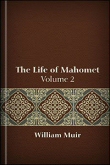
This unabridged, four-volume classic biography of Muhammad is still widely cited for its acute scholarship and historical depth. Volume two contains chapters 2–7:
- From the Youth of Mahomet to His Fortieth Year
- The Belief of Muhammad in His Own Inspiration
- Extension of Islam and Early Converts
- Progress of Islam from the Fifth to the Tenth Year of the Mission of Mahomet
- From the Tenth Year of the Mission of Mahomet to the Hegira, from the fiftieth to the Fifty-third Year of His Life
- The Relation of Islam to Christianity
William Muir (1819–1905) was educated at Edinburgh University and Haileybury College. Muir served as president of the Royal Asiatic Society and published numerous works on Islam, including A Life of Mahomet, Annals of the Early Caliphate, and The Mohammedan Controversy.
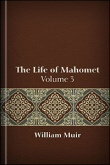
This unabridged, four-volume classic biography of Muhammad is still widely cited for its acute scholarship and historical depth. Volume three contains chapters 8–17:
- Arrival at Medina—Building of the Mosque—From June 622 A. D. to January 623 A. D.
- State of Parties at Medina—First Two Years After Mahomet's Arrival
- Religious Institutions and Miscellaneous Events during the First and Second Years of the Hegira
- Hostilities between Medina and Mecca
- The Battle of Badr—Ramadhan, 624 A. D.
- The Year Following the Battle of Badr
- The Battle of Ohod, 625 A. D.
- From the Battle of Ohod to the Expulsion of the Bani Nadhir
- The Fourth and Fifth Years of the Hegira—625–626 A. D.
- Siege of Medina, and Massacre of the Bani Coreitza, 627 A. D.
William Muir (1819–1905) was educated at Edinburgh University and Haileybury College. Muir served as president of the Royal Asiatic Society and published numerous works on Islam, including A Life of Mahomet, Annals of the Early Caliphate, and The Mohammedan Controversy.
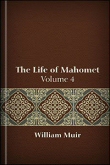
This unabridged, four-volume classic biography of Muhammad is still widely cited for its acute scholarship and historical depth. Volume four contains chapters 18–37:
- Sixth Year of the Hegira
- Pilgrimage to Al Hodeibia
- Embassies to Various Sovereigns and Princes
- The Conquest of Kheibar, 628 A. D.
- Pilgrimage to Mecca
- Battle of Muta, and Other Events in the First Eight Months of 629 A. D.
- The Conquest of Mecca—Ramadhan, 630 A. D.
- The Battle of Honein and Siege of Tayif
- Mary, the Coptic Maid, and her son Ibrahim
- First Half of the Ninth Year of the Hegira, 630 A. D.
- Campaign of Tabuk
- Embassy from Tayif and the Pilgrimage of Abu Bakr—631 A. D.
- Embassies of Submission Received at Medina
- The Farewell Pilgrimage
- Opening of the Eleventh Year of the Hegira—The Pretenders Who Rise Up against Mahomet, 632 A. D.
- Sickness and Death of Mahomet, 632 A. D.
- The Events Which Followed on the Death of Mahomet
- The Burial of Mahomet
- Campaign of Osama on the Syrian Border
- The Person and Character of Mahomet
William Muir (1819–1905) was educated at Edinburgh University and Haileybury College. Muir served as president of the Royal Asiatic Society and published numerous works on Islam, including A Life of Mahomet, Annals of the Early Caliphate, and The Mohammedan Controversy.
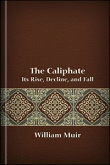
The Caliphate was the first system of government established in Islam, ruled by constitutional and religious law. Established by Muhammad in Medina, it was continued after his death by his followers. The Caliphate: Its Rise, Decline, and Fall traces the history of the early Caliphate after the death of Muhammad, from 632 A. D. to 1258 A. D.
To traverse the little-known paths of Muhammadan history under the guidance of Sir William Muir is a pleasure. He has a thorough grasp of his subject, owing to his deep and diligent research, his extensive reading, and his sympathetic appreciation of Oriental matters, while he holds fairly the balance as an impartial historian.
—Imperial and Asiatic Quarterly Review
The book is a stirring record of conquest, full of dramatic situations, which hold the close attention of the reader. The chief figures stand out vividly on the canvas, so that we see the real character of the men who saved Islam from total wreck after the death of the Prophet.
—The London Quarterly Review
William Muir (1819–1905) was educated at Edinburgh University and Haileybury College. Muir served as president of the Royal Asiatic Society and published numerous works on Islam, including A Life of Mahomet, Annals of the Early Caliphate, and The Mohammedan Controversy.
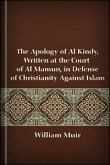
William Muir provides an English translation of Al Kindy's Christian apology, purportedly written around 830 A. D. Abd al-Masih ibn Ishaq al-Kindi, known as Al-Kindi, was an Arab born from a noble family in the plains of Chaldea. Written in dialogue form between a Christian and a Muslim, the apology brings attention to perceived flaws in the Islamic faith and argues in favor of Christianity.
William Muir (1819–1905) was educated at Edinburgh University and Haileybury College. Muir served as president of the Royal Asiatic Society and published numerous works on Islam, including A Life of Mahomet, Annals of the Early Caliphate, and The Mohammedan Controversy.
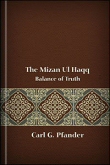
Modeled on the style of Islamic theological works, The Mizan Ul Haqq: Balance of Truth attempts to present the Christian gospel in a form understandable to Muslims. Using the Qur'an to bolster his arguments, Pfander noted the historic contrast between the violence of Islamic expansion verses the peaceable spread of the early church.
Carl (Karl) G. Pfander (1803–1865) studied at the Evangelical Institute in Switzerland where he studied Arabic and the Qur'an. During his first appointment with the Church Missionary Society, he learned Armenian, Persian, and the Turkish language Azerbaijani. In recognition of his scholarship he was awarded a Doctor of Divinity from Cambridge University.
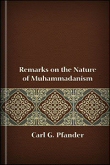
Remarks on the Nature of Muhammadanism is a short commentary on several Islamic doctrines and traditions for missionary use. Pfander divides them under the following headings:
- On God
- On the Creation
- On the Nature of Sin
- On the Means of the Forgiveness of Sin
- On the Nature of the Punishment of Hell
- On Paradise
Carl (Karl) G. Pfander (1803–1865) studied Arabic and the Qur'an at the Evangelical Institute in Switzerland. During his first appointment with the Church Missionary Society, he learned Armenian, Persian, and the Turkish language Azerbaijani. In recognition of his scholarship he was awarded a Doctor of Divinity from Cambridge University.
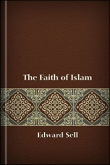
In The Faith of Islam, Edward Sell traces the rise and development of the Islamic religion primarily using Muslim literature. The Faith of Islam includes the following chapters:
- The Foundations of Islam
- Exegesis of the Qur'an and the Traditions
- The Sects of Islam
- The Creed of Islam
- The Practical Duties of Islam
- The Feasts and Fasts of Islam
Mr. Sell's learned and satisfactory work is likely to retain its place for a long time to come as our highest authority on the faith and practice of Islam.
—The Critical Review of Theological & Philosophical Literature
. . . indispensible to every student of Muhammedanism.
—London Quarterly Review
The work contains the best examination of Islam, as a system, and apart from the life of its founder and its historic relations, that we know of, while at the same time it is free from prolixity and admirably clear and readable.
—Calcutta Review
Mr. Sell's work is a scholarly exposition and epitome of the various tenets embraced by Islam, in which he treats clearly and succinctly of each sect in turn. Nothing but praise can be lavished of the whole undertaking.
—Royal Asiatic Society's Journal
Stands alone in the English literature of the subject as an authoritative account of the religion, the law, and the practice of Muhammadanism.
—Free Church Monthly
Edward Sell (1839–1932) received his Bachelor of Divinity from Lambeth in 1881 and an honorary Doctorate of Divinity from Edinburgh University in 1907. A missionary in India for most of his life, Sell authored numerous books about Islam and the Old Testament, including The Historical Development of the Quran, The Cult of Ali, and Islam: Its Rise and Progress.
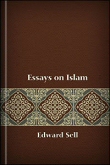
These essays originally appeared in the Modern Christian College Magazine. Essays included:
- The Mystics of Islám
- The Báb and the Bábis
- The Religious Orders of Islám
- The Khalif Hákim and the Druses
- The Status of the Zimmis
- Islám in China
- The Recensions of the Qurán
- The Hanifs
May be cordially recommended as being full of instruction, agreeably written, and correct in detail.
—Guardian
Edward Sell (1839–1932) received his Bachelor of Divinity from Lambeth in 1881 and an honorary Doctorate of Divinity from Edinburgh University in 1907. A missionary in India for most of his life, Sell authored numerous books about Islam and the Old Testament, including The Historical Development of the Quran, The Cult of Ali, and Islam: Its Rise and Progress.
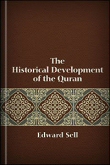
This volume contains the history of the development of the Qur'an, showing how its gradual formation was determined by the events of the Prophet's life. Treated in this way, the Qur'an reveals his change of position towards the various classes of persons with whom he was brought into contact, and by the aptness of its injunctions, apologies, and denunciations, the reader is enabled to see how admirably this 'piecemeal' revelation was fitted to meet the requirements of Islam as they arose.
The chronological arrangements of the Saras according to Mr. Sell's system renders the study of the growth of the Qur'an possible, and we can trace the change in the Mission of the Prophet from that of Preacher to Administrator.
—Daily Chronicle
In Mr. Sell's hands the Qur'an becomes a new book, and sheds a flood of light on the character of its author, and the movement he initiated and guided. Perhaps those who have feared the higher criticism will be reconciled to it when they see the beauty of its method and the value of its results as applied to the Qur'an by Mr. Sell.
—The Critical Review
A valuable addition to the libraries of all interested in work amongst Muslims.
—Indian Evangelical Review
An index of subjects would be most useful to the student of Islam, to whom this book is indispensable.
—C. M. S. Intelligencer
Edward Sell (1839–1932) received his Bachelor of Divinity from Lambeth in 1881 and an honorary Doctorate of Divinity from Edinburgh University in 1907. A missionary in India for most of his life, Sell authored numerous books about Islam and the Old Testament, including The Historical Development of the Quran, The Cult of Ali, and Islam: Its Rise and Progress.
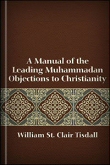
William Tisdall, an experienced missionary, compiled a list of common questions about and objections to Christianity most commonly heard while working in the East. It is not intended to be a manual of Christian dogmatics, but only a handbook dealing simply and briefly with the most frequent Muslim objections to certain Christian doctrines and Christianity in general.
The author's acquaintance with the Koran, its commentaries, and the tradition is wide, and, on the whole, accurate.
—Church Quarterly Review
It would be hard to overstate the value of a work like this to young missionaries and students of the missionary problem. The author is well qualified both by study and practical experience to deal with the subject; and the work gives ample evidence of the greatest care in carrying out the plan.
—The London Quarterly
William St. Clair Tisdall (1859–1928) was a British historian and philologist fluent in several Middle Eastern languages. He wrote numerous books on Islam and served as the Secretary of the Church of England's Missionary Society in Isfahan, Persia.
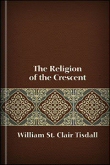
The Religion of the Crescent contains four revised lectures that were originally delivered in England in 1891 and 1892. In highly readable prose, Tisdall introduces the reader to orthodox Islam and stresses to Christians worldwide "the terrible responsibility which they will incur if they any longer neglect the duty of preaching to the followers of Muhammad the unsearchable riches of Christ." Lectures included:
- The Strength of Islam
- The Weakness of Islam
- The Origin of Islam
- The Influence of Islam: Islam and Christianity
He quotes Oriental authorities at first hand, and gives original passages in full in all important cases. He knows his subject, moreover, not only from books, but from long personal intercourse with the followers of the Prophet. It is this fact which makes his candor so valuable in describing what Muhammadanism really is.
—The Church Quarterly Review
This book is a very important work, the result, evidently, of deep study and much thought; it tells us more about Islam than most similar ones do.
—Asian Review
These lectures present a very complete, detailed, and trustworthy account of the Mohammedan faith. The author has seen the system at work in Persia, and has made a study of original authorities. The chapters supply a mass of information not easily obtainable elsewhere.
—The London Quarterly Review
William St. Clair Tisdall (1859–1928) was a British historian and philologist fluent in several Middle Eastern languages. He wrote numerous books on Islam and served as the Secretary of the Church of England's Missionary Society in Isfahan, Persia.
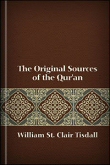
The Original Sources of the Qur'an investigates the original sources from which Islam was developed. Tisdall finds Islam's origins in pre-Islamic customs, Sabaeanism, Judaism, heretical Christianity, and Zorastrianism, and demonstrates his thesis by tracing the sources of certain stories found in the Qur'an and the Hadiths. Chapters include:
- Introductory
- Influence of Ancient Arabian Beliefs and Practices
- Influence of Sabian and Jewish Ideas and Practices
- Influence of Christianity and Christian Apocryphal Books
- Zoroastrian Elements in the Qur'an and Traditions of Islam
- The Hanifs and Their Influence upon Nascent Islam
- Conclusion
The author, after a thorough personal study of many ancient records, has given the result of his researches regarding sources from which Islam has sprung.
—Asiatic Quarterly Review
Dr. Tisdall is a careful scholar and a linguist of no mean ability.
—Missionary Review of the World
The result of many years of study, and the best book on the subject.
—The Moslem World
William St. Clair Tisdall (1859–1928) was a British historian and philologist fluent in several Middle Eastern languages. He wrote numerous books on Islam and served as the Secretary of the Church of England's Missionary Society in Isfahan, Persia.
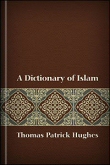
A Dictionary of Islam is presented in tabulated form and gives a concise account of the doctrines, rites, ceremonies, and customs, together with the technical and theological terms, of the Muslim faith. The Dictionary is, for the most part, an exposition of the opinions of the Sunni sect, with explanations of the chief points on which the Shiah and Wahhabi schools of thought differ from it. This volume also provides short biographical notices of persons connected with the early history of Islam.
The aim of the author has been, through a study of Muslim terms, to throw a flood of light on Muslim religion, law, tradition, institutions, customs, and habits of thought, and to trace through the history of its terminology, the changes which passed over Muhammadan civilization from the earliest period down to modern times. This great plan has been executed with extraordinary ability, and the hope which he himself expresses respecting the value which scholars will extend to his labors, will, we are sure, be more than realized.
—The Calcutta Review
Thomas Patrick Hughes (1838–1911) received his Bachelor of Divinity in 1876 and his Doctor of Divinity in 1886, both bestowed upon him by the Archbishop of Canterbury. Hughes and his wife were missionaries for 20 years in the city of Peshawar. After their work in India, Hughes and his wife and children immigrated to the United States in the late 1880's. Hughes worked in a variety of churches in New York and continued to write until his death.
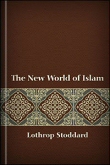
In this riveting look at the East, Stoddard explores the rise of Islam in the nineteenth century and gives an account of the political and economic changes stemming from the breaking up the Turkish Empire and the influence of the West.
The book contains a vast amount of material illustrating the strength and the breadth of the rising tide of unrest from China to Morocco, from Egypt to Afghanistan. No student of the Near East can neglect this volume.
—S. M. Zwemer, International Review of Missions
Lothrop Stoddard (1883–1950) graduated magna cum laude from Harvard University, studied law at Boston University, and received his PhD in history from Harvard as well.
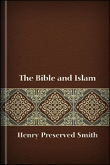
The lectures contained in The Bible and Islam were delivered to the students of Union Theological Seminary in the spring of 1897. The lectures include:
- The Apostle of Allah
- The Common Basis in Heathenism
- The Koran Narratives
- The Doctrine of God
- The Divine Government
- Revelation and Prophecy
- Sin and Salvation
- The Service of God
- The Future of Life
- Church and State
This careful study of Mohammed and his work must always maintain a high position among the works that endeavor to set forth and estimate the sources of power of the strange and most effective religious movement originated by the Prophet of Islam. Professor Smith treats the subject in a more sympathetic manner than many of the older writers have done, but does not fail to point the deficiencies and the grossly evil tendencies incorporated into the movement at its beginning, and becoming more and more evident in its later development.
—Biblio Sacra
The subject has seldom been approached by any Christian writer in a spirit at once so tolerant and so open to the reception of truth.
—The American Monthly Review
Henry Preserved Smith (1847–1927) was Professor of Hebrew and Old Testament exegesis in Lane Theological Seminary and later taught at Andover Theological Seminary, Amherst College, and Meadville Theological School. His numerous works include Critical and Exegetical Commentary on the Books of Samuel (ICC), Old Testament History, and Inspiration and Inerrancy.
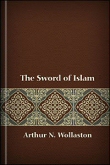
Arthur N. Wollaston provides an easy-to-read account of Islam and its origins in The Sword of Islam. Starting with the history of Arabia prior to the time of Muhammad, describing its rapid growth, and giving the history of the major and minor sects of the religion as it grew, this is a great reference book still relevant for today's world.
Arthur Naylor Wollaston (1842–1902) was the Superintendant of Oriental Inscriptions in the S. Kensington Museum and published numerous books, including The Religion of the Koran and Half-Hours with Muhammad.
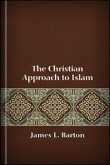
The substance of this book was delivered in a course of lectures at the College of Missions in Indianapolis, Indiana. Revised and extended, the following lectures are included:
- Numbers and Distribution
- Spread of Islam
- Some Struggles of Islam and Christianity
- The Strength of Islam
- Islam and the Ottoman Empire
- Pan-Islamism
- The Great War and Islam
- Foundations of Belief and Practice
- Mohammedan and Christian Conceptions of God
- Common Grounds with Christianity
- Inadequacy of Islam
- Moslem Dissatisfaction
- Attempts at Reform from Within
- Early Attempts to Christianize
- Modern Evangelistic Efforts
- Changed Attitude Toward Christianity
- Difficulties Confronted
- Concessions Required
- The Christian Message to Moslems
- Program of Evangelization
- Reorganization for Conquest
We thank the author for a helpful and extremely useful book.
—International Review of Missions
Indeed Dr. Barton's attitude toward Christian missions is just this—a real and penetrating acquaintance with Mohammedanism, recognizing its strong as well as its weak characteristics, is an indispensable condition prior to Christian work among its adherents.
—The Homiletic Review
Many a Christian will confess to a debt of gratitude to Dr. Barton for this informing and encouraging book, and if perchance it should sometime fall into the hands of a Mohammedan, one wonders whether he, too, would not find it winning the assent of his mind and satisfying the craving of his heart.
—The Biblical Review
James Levi Barton (1855–1936) was a prolific Christian author and missionary. His numerous works include The Unfinished Task of the Christian Church, Daybreak in Turkey, The Missionary and His Critics, and The Near East: Crossroads of the World.
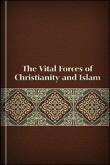
The Vital Forces of Christianity and Islam contains six studies by missionaries to Muslims, a concluding essay by Duncan Macdonald, as well as an introduction by Samuel M. Zwemer. These missionaries worked in Cairo, Urumia, Sumatra, Beirut, Lahore, and Zanzibar. Topics include specific points in Islam with which Muslims are dissatisfied, elements in the Christian gospel and Christian life which appeal to Muslims, as well as the major points that awaken opposition and contention, and much more.
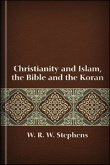
This volume consists of four lectures, revised and enlarged, originally delivered in the Cathedral Church of Chichester. The following lectures are included:
- The Origin of Christianity and of Mohammedanism.
- The Theological Teaching of the Bible and that of the Koran Contrasted
- Moral Teaching of the Bible and the Koran Contrasted
- The Practical Results of Christianity and Islam
A clear, well-informed, and dispassionate survey of the inherent and the practical differences between the Christian and the Mohammedan systems.
—Church Quarterly Review
It is done in a calm, discriminating, judicial manner, and presents the grand points of distinction between the two systems with more justice and in a shorter compass than any other easily accessible book known to us.
—The Princeton Review
William Richard Wood Stephens (1839–1902) was educated at Balliol College, Oxford, ordained in 1865, and taught at Chichester Theological College. His works include Saint Chrysostom: His Life and Times, The English Church from the Norman Conquest to the Accession of Edward I, and The Relations between Culture and Church.
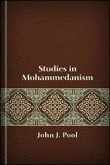
Studies in Mohammedanism is a handy reference book for studying Islam: 41 chapters cover Islamic literature, architecture, holy days and festivals, pilgrimages, proverbs, legends and superstitions, parables, and much more.
John J. Pool is the author of numerous books, including The Land of Idols, Woman's Influence in the East, and Pictures of Life in India.
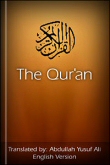
The Qur'an (English)
- Translator: Abdullah Yusuf Ali
- Publisher: Logos Bible Software
- Publication Date: 2004
The Qur'an is one of the most significant pieces of modern literature. It has shaped modern culture and the make up of world religions. Its impact is visible in the adherence of approximately one billion people to the Islamic religion and the teachings of their prophet Muhammad. Originally written by Muhammad in the sixth century A. D., this work is seen by many as the pinnacle of Arabic literature.
This English translation of Al-Qur’an Al-Kareem is the Muslim faith’s holy text. The Meaning of the Holy Qur’an provides a code of living for members of the Islamic faith.
The Qur'an (or Koran, as often transliterated) is the holy book of Islam. This English version was translated from the original Arabic by Abdullah Yusuf Ali. Incorporating this tool into your existing library allows you to study the writings of the Islamic prophet, Muhammad, and gain a better understanding and perspective of the Muslim religion.
The Logos Bible Software edition contains only the text of Abdullah Yusuf Ali's English translation of the Qur'an and not additional commentary or appendices found in some of the print editions that bear the title The Meaning of the Holy Qur'an.
Abdullah Yusuf Ali was born in India in 1872. An Indian-Islamic scholar, he is best known for his translation of the Qur'an into English. Ali died in England in 1953.
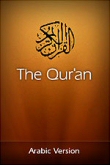
The Qur'an (Arabic)
- Publisher: Logos Bible Software
- Publication Date: 2004
This is the full Arabic text of Al-Qur’an Al-Kareem, the Muslim faith’s holy text. The Qur’an provides a code of living for members of the Islamic faith.
Reviews
19 ratings
Peter Agboola
5/18/2023
This collection is an excellent resource! The job of Christian preachers is to expose Islam, not to protect Islam. Ephesians 5:11 ~ "And do not participate in the unfruitful works of darkness, but instead even expose them."

Kevin Bratcher
6/12/2018

db
2/28/2016
Dear Logos, Long time devoted user - first time complainer (usually accordance deserves my ire more than faith life!) At least with Logos you get what you pay for, and your PB tools have become immensely helpful for translating texts as a PhD student. However, this collection, and the other 'resources' on Islam are appalling. Not only are they so dated as to be useless, they are so evidently biased and inaccurate as to be dangerous! Seriously, it's really pathetic that you are pushing a collection that was mostly published before 1904, ya know, back when people called Muslims Mohammadians or spelled it 'Mohamet'. This collection- and frankly most of your resources on Islam - are biased and misleading. I have yet to see one thing, except maybe the mediocre versions of the Quran that are not aimed at converting Muslims or explaining the 'insidious rise and spread of Islam'. It is beneath you as a company that produces reliable, scholarly digital works to peddle such crap. Really, it makes me embarrassed that I have bought so many of your products!
Chris Lindley
1/9/2016
Most of these resources are very old...there's been a lot of new scholarly research into the Qur'an's origins, and I agree with others that the Hadith ought to be included, an interlinear Qur'an, and even some of the early tafsir (commentary) would be very helpful.Simeon
9/8/2015

Christopher B
7/31/2014
It would be good to have a copy of Ibn Ishaq's biography of Muhammad available in this Collection too.
David Leslie Bond
11/20/2013

Stephen Pallot
11/16/2013